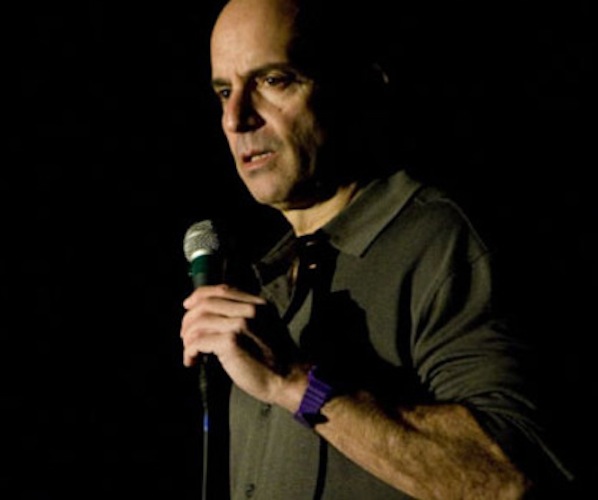Theater Review: Hello Muddah? — “My Son The Waiter”
Comic genres don’t die; they just become niche markets.
My Son The Waiter: A Jewish Tragedy, written and starring Brad Zimmerman, at the Regent Theatre, Arlington, MA through May 25.

Comic Brad Zimmerman — you almost expect the baddah-bum of a snare drum if not a laugh track to accentuate the proceedings.
by Debra Cash
Brad Zimmerman‘s pal Joan Rivers may routinely introduce the balding standup as “the best comic in his price range,” but all told he hasn’t had much of a career. His major commercial acting credit was as Johnny Sacks’ lawyer in The Sopranos. He mostly makes his New York rent reciting the specials of the day. It’s not an easy life and he’s pretty honest that he hasn’t made the most of it.
Zimmerman doesn’t have an ounce of Rivers’ acid outrageousness nor a gram of the insight into political absurdity of his other hero, the late genius George Carlin. What he does have is a suitcase full of musty humor that wouldn’t have knocked it out of the park in the Catskills in 1955. No wonder he says at one point in his theatrical memoir that his fan base “consists of Boca Raton and my building.” Comic genres don’t die: they just become niche markets.
There’s still a price sticker on the red plastic roses in the vase on the cafe table set up on the Regent’s stage. They’re as cheap as what turns out to be a tiny metal trophy earned at a Jewish “sleepaway” camp. The high schooler “voted most likely to work for my father” is now a grown man wearing black jeans, a black tee shirt, and blindingly white running shoes. Zimmerman’s topics are his disappointed mother, health, reality TV, his mother, bad dates, whether golf (golf!) is a sport, and randy-but-not-necessarily-able-bodied senior citizens. Some of these are good — I especially liked some of the geriatric personal ads — but you almost expect the bad-dah-bum of a snare drum if not a laugh track to accentuate the proceedings.
“I was so at home in 1971,” Zimmerman remarks at one point, recalling an adolescence lived before the ubiquity of technology. That’s probably true. He was also at home with his now-deceased dad, whose joshing he evokes in the thin croak of an aging patriarch. The affection of those memories seems authentic, but it is an inadequate salve against his self-contempt. His mother, sidling up to him on the sofa, or calling long distance from Florida, routinely insists that she just wants him to be happy. When Zimmerman wrapped up his time on stage with a little coda about the satisfaction of the journey, I didn’t believe her son either.
Debra Cash has reported, taught and lectured on dance, performing arts, design and cultural policy for print, broadcast and internet media. She regularly presents pre-concert talks, writes program notes and moderates events sponsored by World Music/CRASHarts and cultural venues throughout New England. A former Boston Globe and WBUR dance critic, she is a two-time winner of the Creative Arts Award for poetry from the Hadassah-Brandeis Institute and will return to the 2014 Bates Dance Festival as Scholar in Residence.
C 2014 Debra Cash

